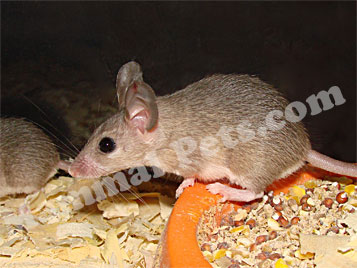
Origin:
Found throughout parts of Africa, India and the Middle East.Description:
The Egyptian spiny mouse is a small rodent that has a possum-like face and a calm temperament. They are a golden brown color with light patches underneath their eyes and behind their ears. Their spines can be black or tan. The overall size for a spiny mouse is 5 to 7 inches. Spiny mice may live up to 5 years in captivity.Feeding:
Spiny mice are omnivorous meaning that they eat both plants and animals. A good diet consists of a combination of seeds, fruits, vegetables and insects. Fresh fruits may include apples, grapes, plums or pears. Vegetables that may be included in their diet are broccoli, sweet potatoes, carrots and corn. A small amount of hard-boiled egg may be added to their food. Meat and poultry that is lean, cooked (not fried) and de-boned may also be added to their diet. These meats should not have salt, sauces or spices added to them. Processed meats should be avoided. A commercial rodent pellet is also good to include in their diet. Try to offer a variety of items since all spiny mice don't have the same preferences. Live insects such as crickets or mealworms may be included in their diet. Do no feed more than one or two of these insects each evening. Do not collect insects from outdoors where they may have been sprayed with pesticides. Water may be provided in a water bottle.Housing:
Spiny mice can be housed in a wire cage or an aquarium. The floor of the cage should have a deep bed of shavings in which they can hide and nest. Nestboxes or hide boxes may be used to create a suitable environment for a spiny mouse. Spiny mice also enjoy playing on exercise wheels. Spiny mice require a warmer temperature than most other mice because they have heat resistant fur that is not built to keep them warm in colder temperatures.Breeding:
The Egyptian spiny mouse usually produce two litters a year. Gestation is about thirty five days and they may produce from 1 to 4 offspring.Note:
Note: Care should be taken when handling a spiny mouse as the tail is very fragile and can be shed. Once lost, it will not grow back.
Compliments of:
S & S Exotic Animals, Inc., 1711 Connorvale, Houston, TX 77039 (281) 590-0426
http://www.sandsexoticanimals.com

